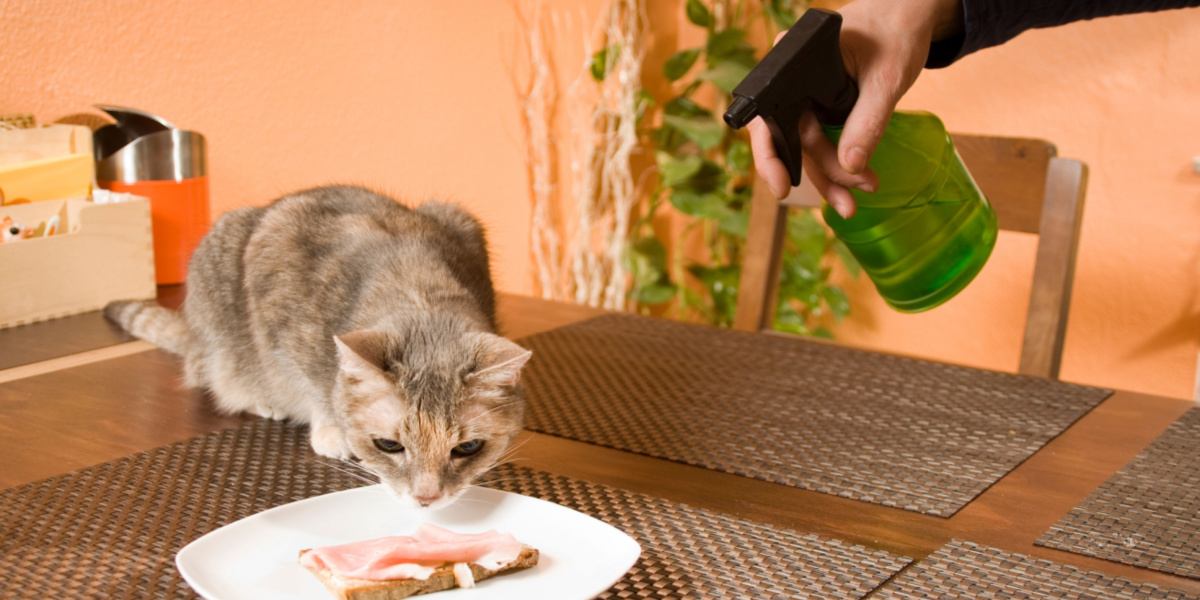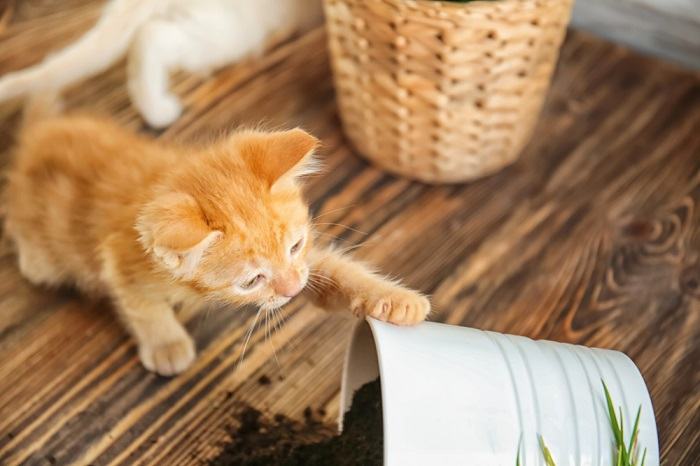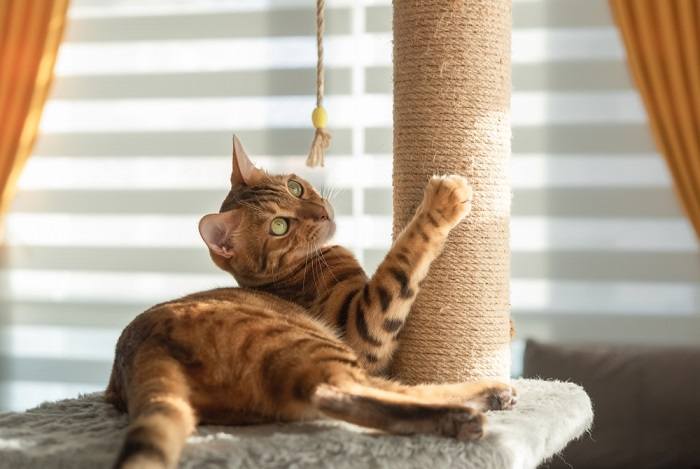
Some cat owners believe that spraying their cats with water when they misbehave is an effective way to correct unwanted behavior. But many cat owners also believe that this is not a good idea. So, should you spray your cat with water?
The truth is that spraying cats with water is not a great idea, and although it might seem like a quick deterrent or easy way to teach your cat not to do something, it has negative effects on your cat in the long-term.
Spraying cats with water is a commonly used method of discipline, but it doesn’t really work.
Spraying your cat with water can have long-term negative impacts on your cat, causing stress and impacting the bond you have with your pet.
To correct unwanted behaviors, use positive reinforcement, provide alternatives, or seek professional advice.Key Takeaways
Does Spraying Cats With Water Work?
The concept of spraying your cat with water is simple—if a cat does something unwanted like scratching your furniture, stealing food from your plate, or showing negative behaviors toward your other pets, picking up a spray bottle and giving your cat a quick squirt with water will teach them not to do it again.
Cats don’t like getting wet, and the shock and surprise of that quick squirt of water is something they see as a negative consequence of their behavior. The theory is they will learn not to do it again. It might seem harmless, but it rarely works. Instead, you end up with a stressed, soggy cat and probably a soggy home, as well!
5 Reasons To Stop Spraying Your Cat With Water
1. It Can Stress Out Your Cat
Cats are very sensitive to stressors in their environment, and the smallest thing can make them feel stressed. Commonly we think of moving home, noisy guests, a new baby, or nasty neighborhood cats threatening their territory causing our cats stress, but something as simple as the way you discipline or train your cat can also lead to stress.
A short squirt of water will take your cat by surprise and frighten them. They are likely to run away and hide as this is their way of dealing with threats. Your cat might hide for hours or disappear into the garden all night because they feel frightened to come back.
Stress can also lead to a number of other symptoms and behavioral problems, such as urinating or defecating outside the litter box, increased aggression, and spending an unhealthy amount of time hiding away. Stress can also trigger feline lower urinary tract disease and a number of other health problems that can be difficult and time-consuming to correct.
2. It Doesn’t Work
Spraying your cat with water might seem like a harmless and sensible way to deter your cat from repeating certain behaviors that we deem problematic or unwanted. It works on the theory of negative reinforcement, but this is a training method that’s generally no longer considered to be a good idea as it comes to the detriment of your pet.
Cats climb on surfaces and scratch furniture because these are actually natural and innate behaviors for them. We need to look for alternative and more effective ways to address and alter these behaviors in our homes. Simply giving them an unpleasant spray with water every time they do something creates fear and stress, when in fact they need an alternative solution or option to choose instead.
Cats need a lot of positive reinforcement and repetition to make associations with good behaviors and rewards, so the occasional squirt of water when you’re around to do it doesn’t really have much of an effect in the long-term.
3. It Might Affect Your Bond With Your Cat
Cats should feel safe and relaxed in their home and with their human family. Regularly spraying them with water can have detrimental long-term effects on their happiness and their bond with you. Cats struggle to make the connection between who sprayed the water, what they did wrong, and where the water came from.
Rather than realizing they got sprayed for scratching the couch, the cat will simply see it as something their owner did to them. They are more likely to end up avoiding you than avoiding the couch, as they see it as a break in trust. Your cat could become fearful of you, or shy away from you because they are worried you will spray them again.
4. Your Cat Will Still Get Away With the Behavior When You Aren’t Around

The water-spray method only works when you are there and see the behavior happening.
Spraying your cat with water might deter them from wandering around the countertops when you are there to see them do it, but what happens when you’re out of the house? If you aren’t there to see them do it, your cat doesn’t get punished.
They will continue to do whatever it is that you don’t want them to do when you aren’t there because they know they won’t get wet or frightened. In fact, your cat might even feel a stronger desire to do something when they know they won’t receive a negative punishment for it.
5. It Can Lead Your Cat To Avoid Water Altogether
Cats aren’t particularly keen on water anyway, which is why spraying them has in the past been seen as a suitable deterrent or punishment. But one negative experience with water can put them off all forms of water, even their water bowl.
An aversion to water can make cats frightened to go outside in the rain or avoid going near the kitchen sink or bathroom. Water of course can pose a risk of drowning for cats, but we don’t want cats to fear certain rooms in the house, or to show reluctance to drink from their own bowls.
Also Read: Why Do Cats Like Faucet Water?
What Should I Do Instead?

Positive reinforcement and providing alternative options to behaviors is more effective than spraying water.
Teaching your cat which behaviors are good and bad is part of being a responsible cat owner, but you must go about it in an appropriate way. Cat behavior is complex, and cats learn differently from us humans and even from our canine companions.
By understanding how your cat’s mind works we can find suitable ways to avoid unwanted behaviors and keep our feline family members happy and relaxed in their home.
Instead of spraying your cat with water, you could try some of these methods instead:
- Provide alternatives: Giving your cat their own scratching posts, tunnels, catnip, and toys will prevent them from playing with your furniture and keep them happy and stimulated.
- Use positive reinforcement: Instead of punishment, reward good behavior with treats and verbal encouragement in a happy and positive tone of voice.
- Remove the source of the problem: If your cat keeps chewing your favorite house plant, simply moving it out of their reach is a more harmless way of fixing the problem.
- Use cat-safe deterrents: A huge range of safe products are available, such as calming diffusers to help your cat relax. Synthetic cat pheromones such as Feliway can create a relaxing environment. You can also use sticky tape or aluminum foil as a deterrent because cats don’t like these textures so it should reduce their desire to scratch a particular piece of furniture.
- Seek advice from your veterinarian or a cat behaviorist: If you are struggling with your cat’s behavioral problems, your vet is always on hand to provide you with advice and guidance. A feline behavior specialist could also provide you with further professional assistance.
Also Read: 12 Signs Of An Extremely Happy Cat
Final Thoughts
Spraying cats with water when they misbehave is an approach that has long been used by cat owners, but we know that it doesn’t work and can have some seriously negative impacts on your cat in the long run.
Spraying your cat with water frightens them and causes them stress, plus they really don’t like to get wet. This could even have a negative impact on the bond you have with your pet and make them feel threatened in their own home.
Cats need to feel safe and relaxed in their home, and it’s far more effective to use positive reinforcement and provide alternatives to deter your cat from doing something we see as undesirable. If you are really struggling with behavioral problems with your cat, your veterinarian or a cat behaviorist can provide additional professional support.
Also Read: 8 Reasons You Should Never Punish Your Cat
Frequently Asked Questions
Why shouldn't you spray your cat with water?
Spraying cats with water causes them stress, it doesn’t stop the problem behavior, and it may affect their bond with you.
Is it cruel to spray a cat with water?
It isn’t cruel to spray cats with water, but it can have a detrimental and negative impact on your pet so it’s not seen to be a suitable method of disciplining your cat and should be avoided.







